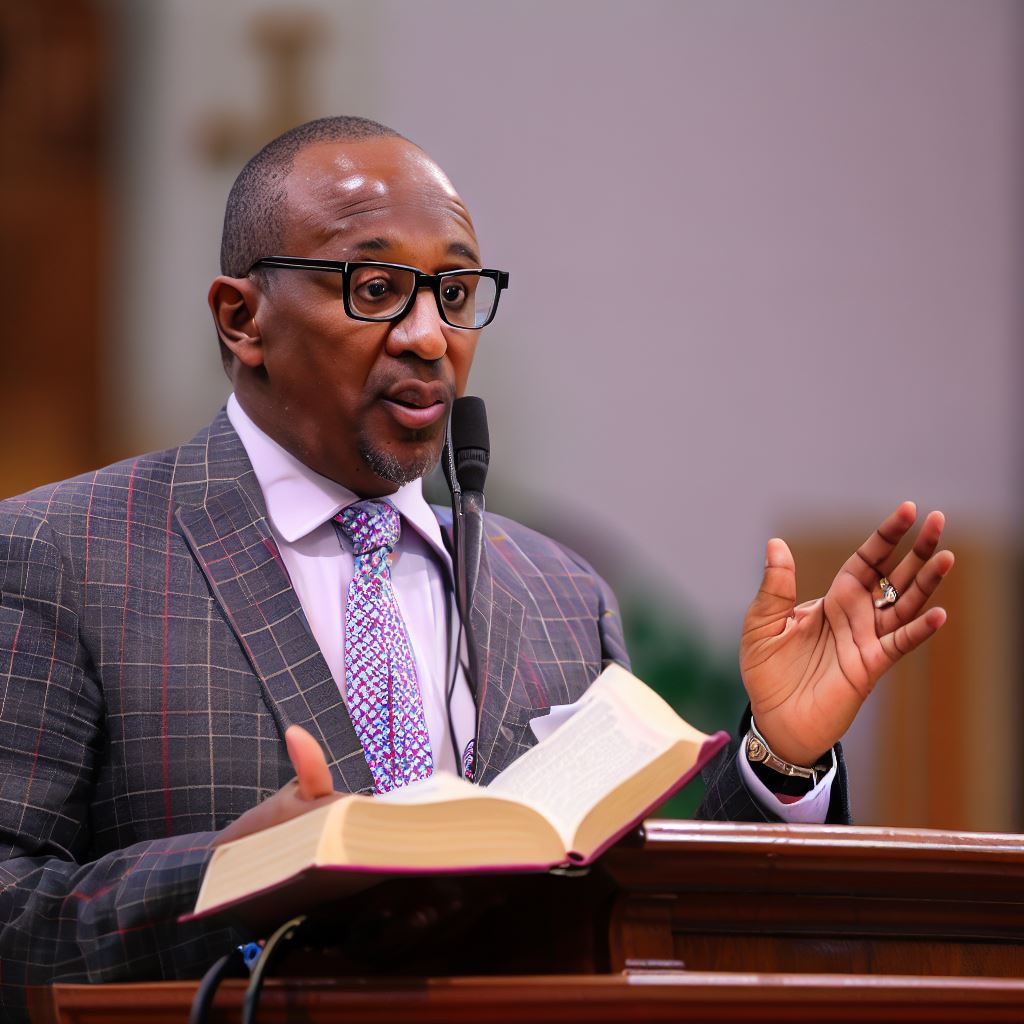Introduction
Pastoral ethics and leadership principles encompass the moral conduct and guiding principles followed by pastors and leaders in churches.
Discussing these topics in the context of Nigerian churches is important for promoting integrity and effective leadership.
Brief explanation of what pastoral ethics and leadership principles are
Pastoral ethics are the moral principles that guide the work of pastors and other religious leaders. Leadership principles are the principles that help leaders to be effective in their roles.
Importance of discussing these topics in the context of Nigerian churches
It is important to discuss pastoral ethics and leadership principles in the context of Nigerian churches because pastors play a vital role in Nigerian society.
They are often looked up to as moral and spiritual leaders. It is therefore important for pastors to be ethical and effective leaders.
Here are some specific benefits of discussing pastoral ethics and leadership principles in the context of Nigerian churches:
- It can help pastors to develop a deeper understanding of their ethical and leadership responsibilities.
- It can help pastors to identify and address ethical challenges in their work.
- It can help pastors to develop and implement effective leadership strategies.
- It can help to promote a higher standard of ethical and leadership conduct among pastors.
- It can help to strengthen the reputation of the church in Nigerian society.
By discussing pastoral ethics and leadership principles, Nigerian churches can help to ensure that their pastors are equipped to be effective and ethical leaders.
Understanding Pastoral Ethics in Nigerian Churches
Definition and significance of pastoral ethics
- Pastoral ethics refers to the moral principles and responsibilities that guide the behavior of pastors.
- It is crucial for pastors to uphold ethical standards as they are entrusted with the spiritual well-being of their congregations.
- Through ethical conduct, pastors demonstrate integrity and promote trust within the church community.
- Pastoral ethics also play a vital role in maintaining the credibility and reputation of Nigerian churches.
Cultural and religious factors influencing pastoral ethics in Nigeria
- Nigeria is a diverse country with various ethnic groups, languages, and religious beliefs.
- These cultural and religious factors greatly influence the ethical codes followed by pastors in Nigerian churches.
- For instance, traditional values and practices may clash with certain ethical principles, creating dilemmas for pastors.
- Additionally, the dominant religions in Nigeria, such as Christianity and Islam, have their own sets of moral guidelines.
Key ethical challenges faced by pastors in Nigerian churches
- Financial integrity is a significant ethical challenge, as pastors handle church funds and donations.
- There have been cases of misappropriation of funds, leading to mistrust and tarnishing the reputation of churches.
- Maintaining confidentiality becomes a challenge when individuals confide in pastors with sensitive information.
- Pastors must balance their duty to keep such information private while adhering to legal requirements.
- Another ethical challenge is the balance between personal relationships and professional boundaries.
- Building close relationships with congregants can become problematic if favoritism or bias arises.
- Ensuring fair treatment and equal care to all members of the church is crucial in maintaining ethical standards.
- Lastly, navigating political and social issues within the church community can pose ethical dilemmas for pastors.
- Pastors must provide guidance while respecting diverse viewpoints and avoiding partisanship.
In essence, understanding pastoral ethics is essential for Nigerian churches and their leaders.
Upholding moral principles not only ensures the spiritual well-being of the congregation but also maintains the credibility and reputation of the church.
Cultural and religious factors must be considered when defining ethical codes, and pastors face various challenges in applying these principles, particularly regarding finances, confidentiality, relationships, and political issues.
By navigating these challenges, pastors can lead their congregations with integrity and promote ethical behavior within Nigerian churches.
Read: Financial Aspects: Understanding a Pastor’s Salary in Nigeria
Leadership Principles in Nigerian Churches
Definition and Importance of Leadership Principles in Church Settings
- Leadership principles play a crucial role in guiding the actions and behavior of church leaders.
- These principles provide a framework for effective leadership and help maintain the spiritual growth of congregations.
- They define the expectations and responsibilities of church leaders in guiding and serving the church community.
- Leadership principles also promote unity, accountability, and transparency within the church leadership.
- By adhering to these principles, church leaders can create a positive and nurturing environment for their followers.
- They establish a clear vision, mission, and values that align with the teachings of the church.
- Leadership principles foster trust, loyalty, and commitment among church members.
- They enable leaders to make informed decisions and handle conflicts and challenges effectively.
- Leadership principles also encourage personal and professional growth for church leaders.
- They empower leaders to effectively lead and inspire others, promoting the overall growth and development of the church.
Traditional Leadership Models in Nigerian Churches
- In Nigerian churches, traditional leadership models were hierarchical, with pastors having ultimate authority.
- Pastors were seen as shepherds, responsible for guiding and instructing their congregation.
- Leadership was primarily focused on spiritual matters, such as preaching, conducting ceremonies, and counseling.
- The authority of pastors was often unquestioned, with limited consultation or input from the church community.
- Traditional models emphasized obedience and respect for church leaders.
- Roles of other church leaders, such as elders and deacons, were defined by the pastor’s authority.
- These models often limited the involvement and influence of members in decision-making processes.
- Church leaders were expected to maintain moral integrity and serve as role models for the congregation.
- However, these traditional models did not always promote inclusivity, collaboration, or servant leadership.
- There was a lack of emphasis on skills, training, and qualifications for church leaders.
Current Trends and Approaches to Leadership in Nigerian Churches
- Nigerian churches are witnessing a shift towards more inclusive and participatory leadership models.
- Leaders today recognize the importance of involving the entire congregation in decision-making processes.
- Current trends emphasize team-based leadership, where various leaders with diverse skills collaborate.
- Servant leadership principles are gaining popularity, focusing on humility, empathy, and service to others.
- Church leaders are encouraged to actively listen, mentor, and empower their followers.
- Leadership development programs and training opportunities are being introduced to enhance leadership skills.
- Churches are embracing technology and social media platforms to reach and engage their congregation.
- Current approaches to leadership foster transparency, accountability, and ethical conduct in church settings.
- Leaders are encouraged to be open to feedback, adapt to change, and prioritize the needs of the congregation.
- These approaches aim to foster a sense of ownership and active participation among church members.
Challenges Faced by Church Leaders in Applying Leadership Principles
- Church leaders in Nigeria often face financial constraints and lack of resources to implement leadership principles effectively.
- Resistance to change and traditional mindsets can hinder the adoption of new leadership approaches.
- Political or power struggles within the church can undermine the application of leadership principles.
- The diversity of church members’ interests and opinions can pose challenges in decision-making processes.
- Inadequate leadership skills and training among church leaders can impede effective application of principles.
- External societal and cultural pressures may contradict or challenge certain leadership principles.
- Church leaders may encounter resistance or opposition when attempting to implement necessary reforms.
- Balancing pastoral responsibilities with administrative and leadership tasks can be overwhelming for church leaders.
- Maintaining unity and resolving conflicts within the church community can be complex and demanding.
- Leaders may face moral and ethical dilemmas that require navigating challenging situations with integrity.
Read: Insights into Nigeria’s Growing Mega-Church Pastor Trend

Relationship between Pastoral Ethics and Leadership Principles
How pastoral ethics guide leadership decisions and actions
- Pastoral ethics provide a moral framework for pastors to make ethical decisions.
- Leadership decisions are guided by values such as honesty, integrity, and accountability.
- Ethics ensure that pastors prioritize the welfare of their congregations above personal gain.
- Integrity in leadership encourages pastors to fulfill their responsibilities with honesty and transparency.
- Pastoral ethics require leaders to maintain confidentiality and honor the trust of their congregation.
Impact of leadership principles on the ethical conduct of pastors
- Leadership principles shape the behavior and character of pastors in their roles.
- Principles like servant leadership emphasize the importance of humility and selflessness.
- Effective leadership principles promote fairness, justice, and equality within the church community.
- Leaders who practice ethical conduct inspire trust and create a positive impact on their followers.
- Leadership principles guide pastors to lead by example and model ethical behavior to their congregation.
Case studies or examples highlighting the intertwining of ethics and principles
- In a case study, a pastor faced a financial dilemma and chose honesty over personal gain.
- By applying ethical principles, the pastor gained the trust and respect of the congregation.
- In another example, a pastor demonstrated servant leadership by prioritizing the needs of the community.
- This ethical behavior had a positive impact on the growth and unity of the church.
- These case studies highlight how pastoral ethics and leadership principles work together to influence decisions and actions.
In fact, pastoral ethics and leadership principles are deeply interconnected in Nigerian churches.
Pastoral ethics guide leaders in making ethical decisions, prioritizing the welfare of their congregation, and maintaining integrity.
Leadership principles shape the conduct of pastors, promote fairness and justice, and help build trust within the church community.
Through examples and case studies, it is evident how ethics and principles intertwine and contribute to effective leadership in Nigerian churches.
Read: How to Find the Right Church: A Guide for Pastors in Nigeria
Current Issues and Controversies in Nigerian Churches
Current ethical dilemmas faced by pastors in Nigeria
- Pastors are confronted with the challenge of handling financial resources transparently and with integrity.
- There is an ongoing debate about the appropriate use of church funds for personal expenses.
- Some pastors are faced with the temptation to exploit their position for financial gain.
- Ethical questions arise regarding the involvement of pastors in politics and partisan activities.
- Pastors are often confronted with the challenge of dealing with cases of sexual misconduct within the church
- There is a need for clear guidelines on how pastors should handle cases of corruption within their congregations.
- Some pastors are faced with the dilemma of maintaining confidentiality when dealing with sensitive information.
- The issue of plagiarism and intellectual property theft by pastors during sermon preparation is a concern.
- There is a need for pastors to address issues of tribalism and discrimination within their congregations.
- Ethical questions arise regarding pastors accepting expensive gifts from wealthy members of the congregation.
Leadership controversies and conflicts in Nigerian churches
- Controversies often arise regarding the selection and appointment of pastors and church leaders.
- Conflicts emerge due to power struggles and the desire for control within church leadership.
- Leadership styles and approaches differ, leading to disagreements and divisions within the church.
- There is a need for effective leadership training programs to address leadership deficiencies.
- Controversies arise when pastors become too authoritarian, suppressing the contributions and opinions of others.
- Leadership conflicts can be fueled by personal ambition and a lack of humility among pastors.
- Disagreements over the interpretation of scripture can lead to conflicts within church leadership.
- Some pastors face opposition and controversy when introducing new or progressive ideas to the congregation.
- Controversies arise when pastors fail to involve the congregation in decision-making processes.
- Leadership conflicts can occur when pastors prioritize personal interests over the spiritual well-being of the congregation.
The consequences of ignoring pastoral ethics and leadership principles
- Ignoring pastoral ethics can lead to loss of trust and credibility among congregation members.
- Failure to adhere to leadership principles can result in divisions and schisms within the church.
- Ignoring pastoral ethics may lead to legal and financial consequences for pastors and the church.
- Leaders who ignore ethics and principles often experience a decline in the spiritual growth of the congregation.
- The reputation of the church and its pastors can be tarnished when ethical misconduct is exposed.
- Ignoring leadership principles may hinder the church’s ability to effectively fulfill its mission and purpose.
- Lack of adherence to ethics and principles can lead to a decrease in church membership and participation.
- Ignoring pastoral ethics and principles hinders the development of trustworthy and responsible leaders.
- The spiritual well-being of congregation members may be compromised when pastoral ethics are disregarded.
- Ignoring leadership principles can result in a loss of respect and influence within the community.
Read: Challenges and Triumphs: A Pastor’s Life in Modern Nigeria
Strategies for Enhancing Pastoral Ethics and Leadership Principles
In order to enhance pastoral ethics and leadership principles in Nigerian churches, several strategic approaches can be implemented:
Developing comprehensive guidelines for pastoral conduct
Developing comprehensive guidelines for pastoral conduct serves as a roadmap for pastors to ensure they adhere to ethical standards and professional conduct.
It helps prevent misconduct or ethical violations that can harm both the pastor and the church.
Churches should establish clear and explicit guidelines that outline expected ethical standards and behaviors for pastors in their ministry.
Promoting transparency and accountability in church leadership
Promoting transparency and accountability is crucial for maintaining trust and integrity in church leadership.
By actively disclosing information and being accountable for their actions, leaders create an atmosphere of openness and ensure responsible stewardship of resources.
Church leaders must create an environment of openness, honesty, and accountability by actively sharing information and inviting feedback from members.
Encouraging continuous education and training for pastors
Churches should prioritize providing opportunities for pastors to engage in ongoing education and training programs to enhance their leadership skills and ethical knowledge.
Continuous education and training are essential for pastors to stay updated on ethical practices and leadership principles.
By investing in their personal development, pastors can better serve their congregations and make informed decisions.
Engaging in discussions and collaborations among church leaders
Engaging in discussions and collaborations among church leaders fosters a supportive community where leaders can learn from one another, share best practices, and address common challenges.
By utilizing collective wisdom, churches can strengthen their leadership and avoid potential pitfalls.
Regular meetings and collaborations among church leaders can create a platform for sharing experiences, discussing challenges, and developing collective solutions for ethical leadership.
By implementing these strategies, Nigerian churches can significantly improve pastoral ethics and leadership principles.
In review, these strategies provide a framework for enhancing pastoral ethics and leadership principles in Nigerian churches.
By developing guidelines, promoting transparency, encouraging education, and fostering collaboration, churches can cultivate a culture of ethical leadership that benefits both pastors and congregations.
Explore Further: Understanding Conflicts and Resolutions in Nigeria’s Clergy
Conclusion
Pastoral ethics and leadership principles play a crucial role in Nigerian churches. They ensure the integrity and credibility of pastors and promote effective leadership.
It is imperative for pastors, church members, and church authorities to prioritize pastoral ethics and leadership principles.
This can be done through training programs, accountability systems, and regular assessments.
Creating an ethical and principled environment is essential for the growth and well-being of Nigerian churches.
By adhering to ethical standards and embracing strong leadership principles, churches can thrive and have a positive impact on society.
The significance of pastoral ethics and leadership principles cannot be overstated in Nigerian churches.
All stakeholders must actively engage in promoting these values, ensuring the church’s authenticity and effectiveness.
Together, pastors, church members, and church authorities can foster an environment that upholds ethical standards and embraces principled leadership for the betterment of Nigerian churches and communities.




